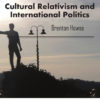New materialism has emerged over the past 20 years as an approach concerned fundamentally with the material workings of power, but focused firmly upon social production rather than social construction. Applied to empirical research radically extends traditional materialist analysis beyond traditional concerns with structural and macro level social phenomena, addressing issues of how desires, feelings and meanings also contribute to social production. New Materialism is currently having a profound effect across disciplines. Rooted in post-marxist thinking, but spreading out on the flat ontology of networks, objects and bodies, New Materialism is an interdisciplinary discussion on the properties of matter in terms of agency, ethical responsibility and immanence. Along with post-humanism, the Anthropocene, nonrepresentational theories and post-Deleuzian thought, New Materialism asks us to reconsider the nature of the human and the non-human, the difference between actual and virtual, the emergence of politics and law in the face of ubiquitous materiality and, above all, the new responsibilities that come with it all.
Sociology and the New Materialism: Theory, Research, Action discusses issues of research design and methods in new materialist social inquiry, an approach that is attracting increasing interest across the social sciences as an alternative to either realist or constructionist ontologies. New materialism de-privileges human agency, focusing instead upon how assemblages of the animate and inanimate together produce the world, with fundamental implications for social inquiry methodology and methods. Conversely, new materialism takes matter as a lively and active participant in social life, problematises core hierarchical binaries such as human/nonhuman, living/nonliving, and idealism/materialism, and expands the remit of what constitutes ‘social life’. Questioning these binaries renders humans as part of a flatter ontology than we might normally think. This Book also considers how core social concerns of responsibility and sustainability might be transformed when we pay attention to the forces and capacities of materialities.













